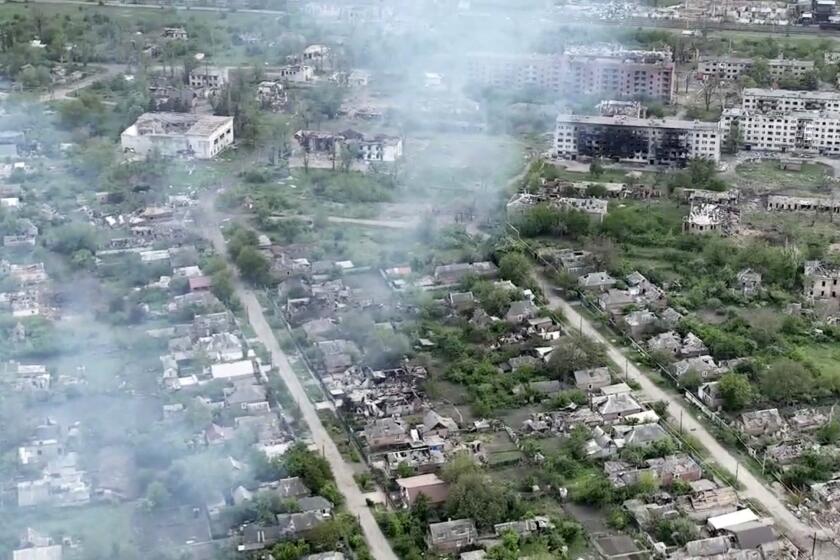Montazeri, a senior cleric and defender of Iranian opposition, dies at 87
Reporting from Tehran — One of Iran’s most senior dissident clerics, a staunch defender of the nation’s opposition movement as well as a learned theologian and pillar of the Islamic revolution 31 years ago, passed away overnight.
Grand Ayatollah Hussein-Ali Montazeri was 87.
His death comes as Iranian protesters prepare to take part in emotionally charged Muharram ceremonies marking the Seventh Century martyrdom of Imam Hussein, the grandson of the Prophet Mohammad and a highly revered figure within Iran’s majority Shiite Muslim faith.
The anticipated ceremonies around Montazeri’s death could further galvanize a protest movement driven as much, if not more, by raw emotion over perceived injustice as rational political calculation.
Adding to the potential for unrest, the religiously significant seventh day following his death will fall on Ashoura, the often-frenzied culmination of Muharram lamentation rituals, when Shiites pour into the streets to beat their chests and weep in ritual mourning of Imam Hussein.
Already today the road leading south out of the capital clogged up with traffic as opposition supporters headed to the shrine city of Qum 60 miles to the south to pay their respects. Residents and students in the city of 1 million began text messaging and emailing friends in the capital to invite them to stay at their homes overnight.
Weeping clerics and seminary students crammed inside and outside Montazeri’s home to extend condolences and grieve, two clerics reached by telephone said. On the restive campuses of Tehran, students gathered to mourn Montazeri upon learning of his death, according to witnesses and video posted online. The main market and schools of his hometown of Najafabad, a city of 350,000, shut down, as residents headed to Qum. Reformist websites reported that Iranians from all over the country planned to descend on Qum for the funeral ceremony Monday.
“Ayatollah Montazeri will be remembered in the history of Iran as brave, open-minded and willing to say the truth at any time, even when encountering danger,” Fazel Maybodi, a midranking reformist cleric and a well-known disciple of Montazeri, said in a telephone interview from Qum.
“He was a faithful source of emulation in Islamic jurisprudence who initiated a huge change in the mentality and attitudes of the senior clergy,” he said. “He braved all threats and dangers to honor his commitment as a senior cleric.”
State-controlled television carried minimal coverage of his death while reformist websites flooded the Internet with photographs of ongoing mourning ceremonies, minute-by-minute developments and remembrances. In the last months of his life, Montazeri offered religious approval to those opposing the government, urging fellow clergy to stand with the Iranian people just as it had in the face of all “oppressive” regimes.
“The regime has savagely suppressed million-strong protesters who were legally objecting to the election outcome,” he wrote in September.
“The grand ayatollahs are well aware of their influence on the regime, and they know quite well the regime needs their approval for its legitimacy,” he continued. “Their silence may give the wrong impression to people that the grand ayatollahs approve of what is underway.”
Born in 1922 in the Iranian town of Najafabad near the city of Isfahan, Montazeri pursued his religious studies in the seminaries of Qum. The scholar and theologian organized clergy to oppose the monarchical regime of the late Shah Mohammad Reza Pahlavi, spending several years in prison during the 1970s.
After the 1979 revolution, he was the designated successor to Ayatollah Ruhollah Khomeini, the founder of the Islamic Republic, until a falling out in the late 1980s over major political differences.
Cast out of Iran’s inner circle of power and stripped of his official posts, Montazeri over the last 20 years became outspoken critic of the Islamic Republic, calling for greater democracy and respect for human rights and civil liberties while often kept under surveillance in conditions that resembled house arrest.
Nonetheless, he served as an influential spiritual guide to the reform movement that peaked in the late 1990s during the presidency of Mohammad Khatami.
His stature and relevance further rose in the months following Iran’s disputed June presidential elections, when he became a strong advocate for the opposition movement and challenged the Islamic Republic’s legitimacy.
“A system which has been acting under the aegis of Islam and has the honor to be Shiite has created distrust towards Islam and religion not only in the world, but also among [our own] people and our young generations,” he wrote in a letter posted to a reformist website in September. “[The system] has depicted Islam as unable to implement justice in society.
In November, he warned members of the pro-government Basiji militia that their violence against demonstrators was not religiously sanctioned. “It would be a misfortune to go to hell for the sake of the worldly desires of others,” he said, according to reformist websites.
The Iranian human rights group founded by Nobel Peace Prize winner Shirin Ebadi awarded a Montazeri an annual award earlier this month.
Iran’s semi-official Fars News Agency said that Ayatollah Yousef Sanaii, another clerical supporter of the opposition, was by Montazeri’s side as he died. His doctor told state television he died of complications due to diabetes. Montazeri’s son, Ahmad, told the Iranian Labor News Agency that his father was died in his sleep late Saturday at his home in Qum.
He will likely be buried in Qum’s shrine of Fatemeh Masoumeh, the second holiest site in Iran, the official Islamic Republic News Agency reported.
Mostaghim is a special correspondent.
More to Read
Start your day right
Sign up for Essential California for news, features and recommendations from the L.A. Times and beyond in your inbox six days a week.
You may occasionally receive promotional content from the Los Angeles Times.






